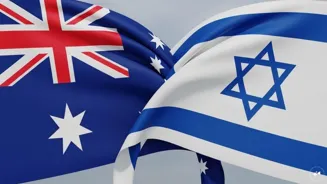These protests coincided with a worsening humanitarian situation in Gaza that prompted the International Association of Genocide Scholars to declare that Israel’s campaign amounted to genocide. The academic group said tens of thousands of children were killed or injured and healthcare, food and education infrastructures were targeted. Israel dismissed the report as "Hamas lies".
The mounting pressure at home appears to have pressured Prime Minister Anthony Albanese to review Australia's ties with Israel. Having had backed Israel in post-October 2023 Hamas raids, he changed tack to announce that Australia would conditionally recognise a Palestinian state, joining the UK, France and Canada's call for the same.
His decision to recognise Palestine also stemmed from a call Albanese had with Israeli Prime Minister Benjamin Netanyahu, who reportedly played down the gravity of humanitarian crisis in Gaza. The change in Australia's position is significant given it has been a long-standing ally of Israel.
Is it symbolic or substantial?
Critics argue that Canberra’s position is more symbolic than substantive. Many feels that Albanese's anger is more about political appeasement than a real disapproval of Israel's actions. Australia's role in Israel's Gaza bombings has met with sharp criticism in protests at home.
Australia supplies parts of F-35 fighter jets that Israel has used in Gaza bombings. It is the only country in the world that makes the parts key for operational mechanism that opens the aircraft's bomb-bay doors.
Australia has dismissed allegations that it supplies arms to Israel while the latter's forces continue their military operations in Gaza. Its Foreign Affairs Minister Penny Wong has argued that Australia only supplies "components and parts that are non-lethal in nature". However, the UN definition categorises these parts as arms trade, says a BBC report.
The continued supply of F-35 parts — while bombings continue in Gaza — has been cited by protesters as Australia's 'non-seriousness' towards stated criticism expressed in remakrs made by Albanese. Human rights groups say recognition of Palestine without halting arms-related exports amounts to political theatre.
The debate echoes developments in the UK, where courts recently rejected an attempt to stop exports of F-35 components to Israel declaring it a political rather than judicial matter. Human rights campaigners denounced the decision accusing governments of shirking international law responsibilities despite acknowledging their exports could facilitate atrocities.
From recognition to recrimination
Israel has reacted with fury on the changed stance from Australia. With the changed viewpoint, a visibly unamused Netanyahu accused Albanese of “appeasing Hamas” and “pouring fuel on an antisemitic fire”.
Within days, the diplomatic row escalated. Australia barred far-right Israeli politician Simcha Rothman from entering the country, prompting Israel to revoke visas of Australian envoys to the Palestinian Authority. Netanyahu’s denunciations grew sharper, branding Albanese a “weak politician” who had “betrayed Israel” and “abandoned Australia’s Jews”.
In Canberra, Albanese attempted to stay measured, saying he would not take the insults personally. Home Affairs Minister Tony Burke was more direct, accusing Netanyahu of “lashing out” and stressing that “strength is not measured by how many people you can blow up or how many you can leave hungry”.
BBC quoted Ian Parmeter of Australian National University as saying that Canberra has not sounded so distant from its long-standing ally in the past. He argued that mass public protests, combined with Netanyahu’s denial of Gaza’s humanitarian catastrophe, compelled the Albanese government to shift course.
A diplomatic balancing act
At the same time, Australia expelled Iran’s ambassador over alleged links to antisemitic attacks in Sydney and Melbourne — its first such expulsion since the Second World War. Israel welcomed the decision with one spokesperson claiming Netanyahu’s intervention had been decisive. Australia rejected the suggestion outright as “complete nonsense.”
Despite the fiery rhetoric, the fallout may not leave permanent scars, experts say. Though Australia and Israel do not share a large bilateral trade relationship, people-to-people ties have been strong.
For now, however, the intersection of arms exports, domestic protest and diplomatic clashes has left relations between Australia and Israel at their most strained in decades. How the political masters in two the countries respond to the current diplomatic brawl amid an ongoing reset of geopolitical order is likely to define the future course of Australia-Israel bilateral ties.














